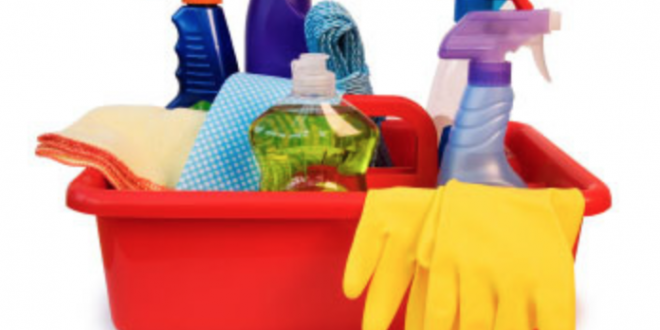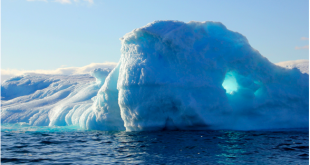By Jamie Minden
The entire ecosystem is affected by our decisions from every aspect of life, but we have a bit more control over our footprint in the cleaning department. I know no one likes cleaning, but you have to admit- it has got to be done. So why not do it in a way that’s eco-friendly?
You usually don’t think of your cleaning products as pollutants that are muddying up our air and water- why should you, they’re supposed to do the opposite! But in fact, cleaning products make the world far dirtier than most people think. Many common cleaners contain chemicals that contribute to smog, pollute our drinking water, and are poisonous to animals. Worse still, many products do not decompose after use and will never leave the planet once used. When you wash cleaner down the drain it does not simply vanish, it often goes on to pollute the environment further downstream.
The U.S. Environmental Protection Agency has tested the potency of many commonly used household chemicals, dubbing the worst of these: “Volatile Organic Compounds”. The EPA has found that Volatile Organic Compound levels are 2 to 5 times higher inside homes than they are outdoors, and that while cleaning with products containing VOCs, pollutant exposure rises to a dangerous level. Phthalates are another very dangerous group of chemicals. Found in pretty much every plastic or vinyl product designed to be soft, flexible, or smell good, they cause damage to the kidney, liver, lungs, and reproductive system. It’s so serious that men have been known to experience erectile dysfunction disorder as young as 20 as a result of phthalate exposure. Research is ongoing as to the extent of the problem, but scientists agree that phthalates do far more harm than good.
Microbeads are another catastrophic ingredient in many cleaning and self-care products. These tiny beads wash down drains and eventually make their way into waterways, irreversibly damaging ecosystems. They are only banned in three states, but you can protect ecosystems by purchasing products with oatmeal or pumice exfoliants instead. You can also reduce toxic waste by buying organic and biodegradable wet wipes- even small changes will make a big difference for one lucky ecosystem.
But do not lose hope! While most name brands contain toxins, a growing number of green cleaning companies are emerging, working to reduce the global toxic burden. The Environmental Working Group is a nonprofit, nonpartisan organisation dedicated to “protecting human health and the environment”. Their Guide to Healthy Cleaning displays a safety rating for the environmental and health hazards of over 2,500 products from sunblock and toiletries, to baby wipes and window cleaner. Norwex products are all organic, and meticulously researched and tested so that they will clean your home safely and effectively. Their website will help any household find new ways to live a greener, cleaner lifestyle with a free Carbon Footprint Calculator and “How Safe is Your Home” quiz. Seventh Generation and The Honest Company sell products that are plant based and good for your health. Dr. Bronner’s Pure Castile Soaps are very multipurpose, and you’ll find that their products are also free of chemicals and synthetics. But you also have to watch out for fakers. Simple Green for instance, is marketed as environmentally friendly, however its long list of ingredients prove that this allegedly “simple”, “green” cleaner is anything but. Not only that, but the Environmental Working Group reports that its “acute aquatic toxicity” is “of high concern”– not my idea of a glowing recommendation. Checking to see if a product is animal friendly is a quick and easy way to spot fakers. Cruelty free products are not tested on animals, and are therefore far less likely to contain harmful chemicals. Conversely, they are good for the bunnies, too. So look out for brands approved cruelty free by Leaping Bunny, or another certified organisation. (You can usually check the back of the bottle for a logo).
But you may be surprised to find that you probably already have a few eco-friendly cleaning products in home right now. So safely dispose of that clorox and open up your cupboard- you might find that the key to keeping your counters clean is in in the baking isle.
Vinegar is a natural antibacterial disinfectant that can be used to wipe down surfaces from countertops to bathroom drains. If you have a particularly tough stain to loosen, you might add some baking soda to your vinegar spray to make that good ‘ol science fair cocotion that we all know so well. Baking soda is also a natural tarnish remover for your copper and brass pots, deodorizes and sanitize surfaces, and is gentle enough to be used to clean marble. On top of all that, it can work miracles on tough to remove stains, as I recently discovered in a brief experiment involving bike grease and a pair of khakis. A solution of 3% peroxide is perfect for disinfection and can be used to whiten walls, clothes, and generally brighten any counter surface.
Essential oils are also great alternatives to hormone-disrupting air fresheners. If you mix a spray bottle of water and a few drops of essential oil, you can freshen up any living space.
Be sure to use some essential oils or lemon whenever working with vinegar because the scent does tend to stick around for an hour or two after cleaning with it. A combination of all 5 of these miracle cleaners can whiten that toilet bowl too and save you from some serious scrubbing. Just remember to never mix a cleaning product containing bleach and one with ammonia in it.
Clearly, not all household products as cleanly as they appear, but I hope that you learned a thing or two today about keeping the world clean for the next generation.
Sources Cited:
https://www.norwexmovement.com/
http://modernserenity.com/2009/12/ridding-your-bed-of-harmful-chemicals/
http://www.norwexmovement.com/why-organically-grown-cotton-may-be-right-for-you/
https://insteading.com/blog/eco-friendly-cleaning-products/
https://homeguides.sfgate.com/household-cleaner-affect-environment-79335.html
http://apps.sepa.org.uk/spripa/Pages/SubstanceInformation.aspx?pid=1
https://www.ncbi.nlm.nih.gov/pmc/articles/PMC5675227/
https://noharm-uscanada.org/issues/us-canada/phthalates-and-dehp
https://toxtown.nlm.nih.gov/chemicals-and-contaminants/phthalates
https://www.epa.gov/indoor-air-quality-iaq/volatile-organic-compounds-impact-indoor-air-quality
 Tempus Magazine By Students, For Students
Tempus Magazine By Students, For Students 



